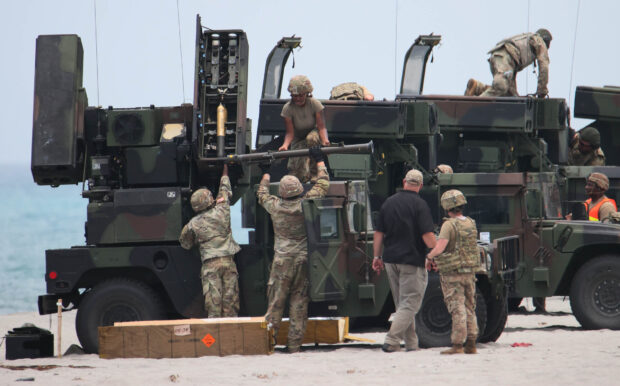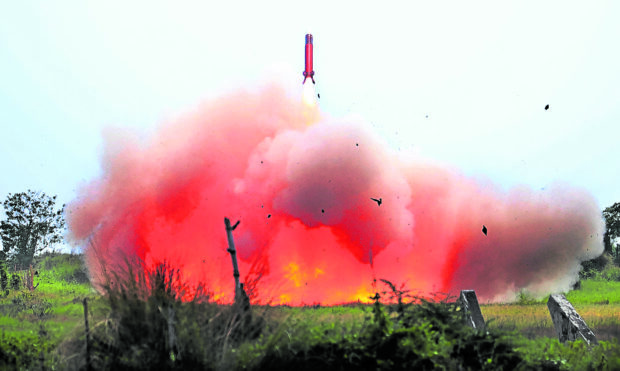US firepower on display as ‘Balikatan’ nears close

WAR GAMES PREP | American soldiers prepare missiles for the Avenger air defense system, a self-propelled surface-to-air missile system, during a live-fire demonstration in this year’s Philippine-US “Balikatan” military exercises in San Antonio, Zambales, on Tuesday, April 25, 2023. (Photo by MARIANNE BERMUDEZ / Philippine Daily Inquirer)
MANILA, Philippines — American troops showed off their firepower during the “Balikatan” (shoulder-to-shoulder) war games with their Filipino counterparts on Tuesday, performing the first test-fire of their premier Patriot and Avenger air defense missiles in the country, in a town facing the West Philippine Sea.
During drills in the coastal town of San Antonio, Zambales, two simulated cruise missile threats from the sky were knocked out by the Patriot, one of the most sought-after air defense systems in the US weapons market.
The Humvee-based Avenger air defense systems with Stinger missiles, which also debuted in the country, targeted drones for the live-fire exercise.
Both weapon systems are being used by Ukraine to defend itself from Russia. The Patriot donated by Western allies arrived only last week in Ukraine after months of training by Ukrainian troops.
But Maj. Gen. Brian Gibson, commander of the 94th Army Air and Missile Defense Command, reiterated that the Balikatan live-fire exercise and its chosen locations were not directed at any perceived enemies.
Not against any adversary
“Balikatan is against no particular individual country or adversary. It’s an opportunity to exercise between our militaries but also some other partners involved,” he told reporters.
“Whether it’s the South China Sea, whether it’s the northern Philippines, whether it’s in another country… it’s the point that we’re doing it together,” Gibson said.
“You’ll see around the globe where our US Patriot forces operate, and not just here in the Indo-Pacific, the recognition that this system is lethal, combat-credible, has a history in crisis, conflicts and peace, to both assure and deter,” he said.
The largest-ever Balikatan exercises, involving almost 18,000 troops from the United States, the Philippines and Australia, are taking place in various locations around the country, amid China’s growing assertiveness in the region. The war games started on April 11 and will end on April 28.
The drills followed the official announcement of four new locations under the Enhanced Defense Cooperation Agreement (Edca), allowing the expansion of American military presence in the Philippines, from an initial five sites under the deal signed in 2014.
The four new sites include three in northern Luzon close to Taiwan (Camilo Osias Naval Base and Lal-lo Airport, both in Cagayan, and Camp Melchor dela Cruz in Gamu, Isabela, and one near the West Philippine Sea (Balabac Island in Palawan province).
The Patriot (Phased Array Tracking Radar to Intercept of Target) system was developed by US weapons manufacturer Raytheon and is used in 17 countries. It can track and shoot down attacking missiles and aircraft with a minimum flight time of less than nine seconds and can travel up to 70 kilometers to a target.

MISSILE DEMO | The Patriot, a mobile surface-to-air missile system, is launched during a live missile demonstration in the “Balikatan” military drills held on Tuesday at the Naval Education and Training Command in San Antonio, a Zambales town facing the West Philippine Sea. (Photo by MARIANNE BERMUDEZ / Philippine Daily Inquirer)
The Avenger built by Boeing, on the other hand, is a fully automated, short-range air defense system and is the Army’s premier shoot-on-the-move air defense weapon with a speed of 55 miles per hour (88.51 kph) and a range of 275 miles (442.57 km).
Filipino soldiers were briefed on the weapon systems last week, also in Zambales.
Main event
In another first, on Wednesday, the two allies will demonstrate their joint capabilities by sinking a mock enemy ship off Zambales with rockets and missiles fired by weapon systems used by the Philippine and US militaries, the main event for this year’s Balikatan.
Retired Philippine Navy patrol ship BRP Pangasinan (PS-31), a World War II-era vessel decommissioned in 2021 after more than seven decades of service, will be called back into action for a final mission.
President Marcos is expected to witness the littoral live-fire event on Wednesday.
Last week, the ship underwent a rigorous cleaning process and was stripped of hazardous material and chemicals.
“We made sure that we are in compliance with the law,” said Archie Balingbing of Taitech Marine Sales and Services Corp., the company contracted to clean the ship, in a video taken by the US Navy.
Hazardous and toxic wastes were removed “because it can cause pollution to the sea,” she said.
BRP Pangasinan, a former US Navy patrol craft escort built in 1943, was commissioned by the Philippine Navy in 1948.
The decorated former Malvar-class patrol vessel saw action in different parts of the country before it was decommissioned in March 2021.